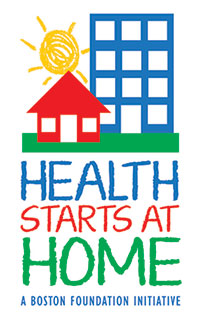Evaluation report finds powerful connection between housing stability and improved health in families with young children
Evaluation of the Health Starts at Home program tested impact of partnerships between health care, housing organizations in four communities
June 1, 2021
Boston – A final evaluation of the Boston Foundation’s five-year Health Starts at Home initiative finds that families in the program, which supported health care and housing collaborations to improve child and family health for low-income families experiencing housing instability, improved their housing stability and health outcomes for caregivers and children.
Health Starts at Home was launched by the Boston Foundation in 2015, supporting four health care/housing partnerships that could collaborate to improve health care and housing access for families with children under 12. Collaborations enrolled families in their services between 2016 and 2019, with 2020 giving researchers from Health Resources in Action (HRiA) and Urban Institute a chance to gather follow-up data.
Each partnership developed a unique approach, designing and implementing programs to improve service delivery and reduce housing instability for participating families. The HRiA and Urban Institute researchers tracked 137 families in the programs and found that after 12 months:
Families were less likely to experience indicators of housing instability, such as housing unaffordability (from 66% of families at baseline to 52% at 12 months), living in poor quality housing (from 58% to 30%), living in crowded housing (from 44% to 25%), or having concerns over eviction, homelessness or forced moves (from 92% to 66%). Data also showed that utilization of homeless shelters and emergency assistance declined considerably, from 31% before enrollment to 12% after enrollment in the program.
“The research suggests the power of advocacy and support systems to help families wrestling with housing instability navigate what is a complex and sometimes convoluted system for even trained staff,” said Heather Nelson, Managing Director, Research and Evaluation at Health Resources in Action. “By connecting families with both health care and housing supports, Health Starts at Home had a measurable impact on housing stability and reduced the strain that instability places on caregivers and children.”
Data also showed a shift in the percentage of families who were living in their own apartments, rather than with friends and family, in a shelter or in transitional housing.
The data importantly show that the housing impacts were coupled with a powerful health impact on the caregivers and children taking part. Caregivers who self-reported their health on a poor to excellent scale at the outset of the program and after 12 months reported they were less likely to say they and their children were in fair or poor health after the year. Perhaps more strikingly, the high rates of anxiety and depression symptoms observed among the caregivers at baseline dropped sharply. Specifically, the percent of caregivers who scored positive for anxiety symptoms decreased from 63% at baseline to 42% at 12-month follow-up, and the percent scoring positive for depression symptoms dropped from 60% at baseline to 37% at 12-month follow-up.
“The data illustrate both the multi-dimensional impacts of housing instability on the health and wellbeing of the families who experience it, and the impact that a cross-sectoral partnership that meets families where they are can have to address it,” said Soni Gupta, Senior Director of Neighborhoods and Housing at the Boston Foundation. “By empowering health care workers to collaborate with housing partners and help families navigate these complex systems, we can see a real, human benefit for caregivers and children.”
The health benefit for children also showed in the reduction in the number of emergency and urgent care visits by children enrolled in the program, even among those families for whom housing instability did not improve over the 12-month evaluation period.
Researchers coupled the quantitative data with qualitative focus groups to better understand the impact of the varied intervention models. Focus group participants described the program staff as trusted resources, helping them navigate complex housing, healthcare, and school systems, and alleviating a lot of stress and depression. Overall, the evaluation illustrates the importance of culturally and linguistically competent resources for vulnerable families and suggests providing support services and housing assistance together co-contribute to improvements in caregiver health, and reductions in anxiety and depression.
As one grantee stated, “Every single member of a family was undocumented and living apart, and this family has now moved into housing and one parent is employed…They are actually living. Before I could see them physically hurting and broken. You can see the difference in them.”
Findings further suggested that the enrollment strategy of recruiting families through community health care settings may well have assisted families otherwise disconnected from public services or less likely to be able to advocate for themselves. The interventions also helped identify families whose physical and behavioral health vulnerabilities might not have been supported in more traditional housing programs.
Grantees, too, saw benefits, noting that their cooperative efforts that centered on families and their unique situations and needs improved their service delivery. Participation also helped develop an ongoing ability to collaborate to larger cross-sector systems changes that extend beyond Health Starts at Home.
To learn more about the partnerships involved in the Health Starts at Home program and access the complete evaluation for download, visit tbf.org/reports.




